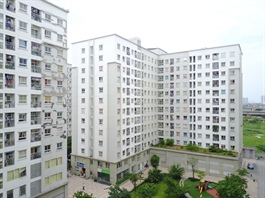Due date real estate bonds heap pressure on developers
Due date real estate bonds heap pressure on developers
Although real estate experts are worrying about a debt of VND 360 trillion ($15.6 billion) in bonds that will be due date in the 2022-2024 period, some businesses have returned to issuing bonds for potential investments in their next periods.
Khang Dien Housing Trading and Investment JSC on August 20 approved a plan to issue corporate bonds privately. The maximum total issuance value is VND800 billion ($34.7 million).
The number of apartments sold in Hanoi and Ho Chi Minh City dropped from 66,000 units per year in 2015-2019 to 29,000 units in 2020-2021, Dung Minh
This bond lot has a 3-year term and is issued at one time only. The nominal interest rate is fixed at 12 per cent per year and the release time is expected to be no later than the end of the third quarter of 2022.
According to its plan, Khang Dien will use these bonds to pour more capital into International Consulting Co., Ltd. to develop their projects. The new capital of this company after additional investment by Khang Dien would be at VND 1.5 trillion ($67 million), of which Khang Dien accounts for 99.9 per cent of the capital.
In June, Hung Loc Phat Real Estate Investment JSC announced the successful issuance of 150,000 bonds with a par value of VND1 million ($43.50) per bond for the domestic market. The bond batch has a term of 15 months and matures in June 2023.
In Ho Chi Minh City, Hung Loc Phat has implemented a series of projects such as Hung Phat 1, Hung Phat Silver Star, and The Golden Star. In Binh Thuan province, Mui Ne Summerland Project has a scale of 31.5 hectares and is considered one of the company’s biggest projects to date.
In a report sent to the Prime Minister in June, the Ministry of Finance stated that around VND62.5 trillion ($2.7 billion) of real estate bonds will be due this year, accounting for 43.2 per cent. In 2023 and 2024, the figure will balloon to VND360 trillion ($15.6 billion).
Nguyen Quang Thuan, CEO of Fiin Group, said that besides bank capital, real estate bonds have become a capital mobilisation channel for many real estate businesses in the past few years. According to figures from Fiin Group, 54 listed real estate enterprises currently have a loan balance of about VND435 trillion ($18.9 billion).
“This number is very large, equivalent to half of all the total credit in real estate. In addition, there is also international credit capital, with a mobilised balance of about $4 billion,” Thuan told VIR. “This shows that international investors remain interested in the Vietnam real estate market.”
However, a wider view is required. “In fact, bank credit to support real estate businesses is not large, accounting for only 14 per cent, while the rest is from customers and partners. To properly assess real estate credit, we need a broader perspective, not only on the credit room or corporate bonds but the entire credit mechanism in this area,” added Thuan.
Due date real estate bonds would not only put pressure on real estate businesses but also affect the liquidity risk of real estate agents who have committed to buy back bonds. In addition, this debt repayment pressure can affect the stock market because stocks are pledged as security for bonds or pledged to buy low-quality or problematic bonds.
Regarding the issuance of real estate corporate bonds in Vietnam, there was a sharp decline in the first half of this year but did not totally freeze. Thuan shared that the credit quality of domestic real estate businesses is still rather stable, with an overall leverage level of less than 0.5-fold.
The overall financial health of real estate companies is still relatively safe, except for companies set up for the purpose of raising bond capital or borrowing bank credit.
Notably, the number of apartments sold in the market in Hanoi and Ho Chi Minh City has dropped to less than half, to 29,000 units per year in 2020 and 2021, compared with 66,000 units per year in the 2015-2019 period.























